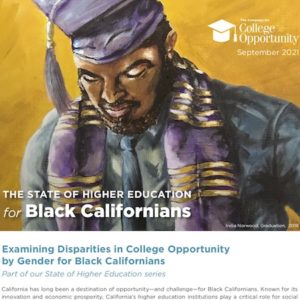 A new report from The Campaign for College Opportunity examines gender and racial differences in educational attainments for African Americans in California.
A new report from The Campaign for College Opportunity examines gender and racial differences in educational attainments for African Americans in California.
At the campuses of the University of California, 73 percent of Black men and 81 percent of Black women graduate within six years. More than 80 percent of both Black men and Black women who transferred into a University of California campus after completing some college work elsewhere, earn a diploma within six years.
However, the four-year graduation rate for Black men (50 percent) is 20 percentage points lower than that of White men (70 percent). For Black women at the University of California, the graduation rate (65 percent) is 14 percentage points lower than their White female counterparts (79 percent).
In the large California State University System, the four-year graduation rate more than doubled for Black women, from 10 percent of Black women enrolling in 2011 to 24 percent of Black women enrolling in 2016. For Black men, the four-year graduation rate also doubled during the period but the graduation rates were much lower than for Black women. For Black men enrolling at a CalState campus in 2001, only 7 percent graduated within four years. By 2016, the rate had doubled to 14 percent but this is still 10 percentage points lower than the rate for Black women.
Some 53 percent of Black women who enrolled at a California State University campus in 2011 earned a degree within six years compared to 42 percent of Black men.
Only 8 percent of Black men and 10 percent of Black women who enrolled in California Community Colleges in the 2016-17 academic year graduated with a degree or certificate within four years.
The authors conclude that “strengthening efforts that improve student supports, eliminating ineffective remedial education, strengthening the transfer pathway, improving hiring of diverse faculty, staff and leadership, and providing adequate financial aid to ensure college is affordable are key to a more equitable higher education experience for Black Californians.”
The full 14-page report, Examining Disparities in College Opportunity by Gender for Black Californians, may be downloaded here.











I sure hope those degrees earned are worth it for those young people. Sometimes I think that we should be discouraging our young people from attending college, unless they intend to major in something with a job waiting for them afterwards like accounting, nursing, computer programming, etc. …
Yes! Not in the humanities or liberal arts, which would only allow them to work as a professor, spreading propaganda. STEM for the future.
Hey Allen,
I know you can’t be that narrowminded in the 21st century. Based upon your infantile comment, so long the “humanities and liberal arts” support your world view of history, education, law, finance, and medicine it’s acceptable. However, heaven forbid if a different perspective and analysis is brought to the forefront critically challenging such narratives then it’s problematic. Are you kidding me! Grow up pal.
Oh really? Tell me, what can one do with a Gender studies, women’s studies, Africana studies besides teaching, research, or working at a museum?